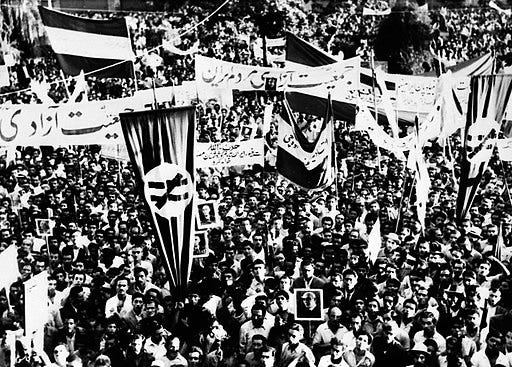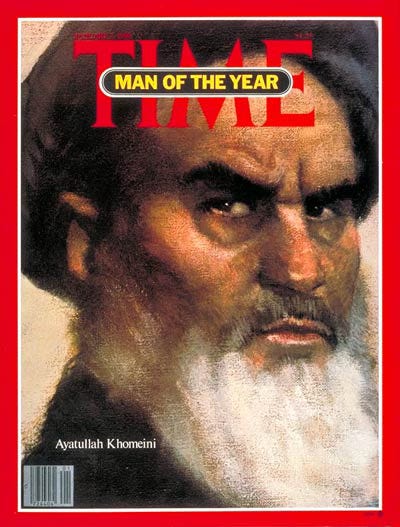Crowds in the streets of Tehran show support for Prime Minister Mohammad Mosaddegh during a coup attempt in 1953.
The U.S. overt military operation to overthrow the Islamic Republic of Iran has finally begun. American bombers struck Iranian nuclear facilities at Fordow, Natanz and Isfahan on Saturday. Journalist Seymour Hersh reported on June 19 that one of his long-time Washington sources told him that all will be “under control” if Iran’s Supreme Leader, Ali Khamenei, “departs.”
As we await the fate of Khamenei, consider these 5 things about the war on Iran.
1. The CIA has been in the covert regime-change business since WWII and Iran was one of its first experiments.
When World War II ended in 1945, a new war – the Cold War – broke out. The Allies dumped the Soviet Union and fought to contain its bad-for-business communism. Iran, which had been neutral during the war (and, thus, was invaded by the Allies in the Anglo-Soviet invasion of 1941), began its struggle to take over the Anglo-Iranian Oil Co., expel the company’s British owners and keep oil profits at home for the Iranian people.
In 1953, fearing disruption in the global oil supply and wanting to keep Iran from falling into Soviet orbit, Operation Ajax overthrew the democratically elected Prime Minister Mohammad Mosaddegh. Mossadegh was replaced by a much more Western-friendly prime minister, handpicked by the CIA. The playbook of manufacturing/funding government opposition until the regime topples was repeated the next year in Guatemala – not so successfully later in Cuba or Vietnam.
2. The Islamic Republic of Iran has been the most successful Third World country.
The whole Middle East was casting off the superpowers in 1979. Saddam Hussein became president of Iraq, the Soviet Union invaded Afghanistan, and the repressive, U.S.-installed Shah of Iran was finally ousted in a popular revolution. Exiled cleric Ayatollah Ruhollah Khomeini returned to Tehran in triumph and Muslim students stormed the U.S. embassy to seize 66 hostages. As the hostage standoff plodded through 1980, the demonization of Iran reached sulfuric proportions. President Jimmy Carter severed diplomatic relations in April.
“Nuke Iran” t-shirts became common sights, as were effigies of Khomeini hanging from poles. Vince Vance & the Valiants hit the charts with a parody of the Beach Boys' “Barbara Ann” (“Bomb bomb bomb, bomb bomb Iran...”) The draft – dismantled when the Vietnam War wound down in 1975 – was revived in the 1980 run-up to an invasion of the fledging Islamic republic by none other than Saddam Hussein.
“Many Americans hoped that the Iraqi leader was somehow redeemable and could be worked with as a difficult but manageable partner,” wrote Brookings Institution senior fellow Bruce Riedel is his 2013 essay, Lessons from America’s First War with Iran. “America tilted toward Iraq, hoping it would hold back the 'medieval fanatics' to the east from gaining control of the world’s oil reserves.”
Khomeini emerged as the superhero for the politically non-aligned world – he refused to kowtow to either global superpower. He dubbed the U.S. the “Great Satan” and the USSR the “Lesser Satan.” Israel was his “Little Satan.” Both sides played him, and he played both sides.
Time magazine's 1980 Man of the Year
3. Middle East politics is best understood as a rivalry between Iran and Saudi Arabia. Oil is also in there.
Early on, Carter was sympathetic to an independent Iran and assisted in stopping the Iranian military from taking over after the shah was deposed. Carter's courtship drew the line at trading arms for hostages. Presidential candidate (and later president) Ronald Reagan was wooing Khomeini as well, but kept it secret. He let the Iranians know that if they held onto the American hostages, Carter might lose the election; Reagan would be most grateful. The Iran-Contra scandal – made public in 1986 – was a real government conspiracy that arguably rivaled Watergate in the annals of deep-state deception. Americans learned that Reagan had defied Congress and U.S. sanctions against Iran by selling weapons through a third party – Israel.
Little-known fact: the Israelis preferred Iran to Saddam. Iran had been the second Muslim-majority country to recognize the state of Israel in 1948. Iranians were Persians, not Arabs. Shi'ite Muslims rather than Sunnis. On the periphery of the Arab world, Iran could counter the dreaded hostility of Arab leaders in Iraq and Saudi Arabia, argued Israeli leaders like Yitzhak Rabin and Shimon Peres. In early 1980, Israel started shipping spare tires for F-4 warplanes to Iran without informing Carter – who was livid when he finally found out. In 1981, Israel sold Iran $75 million worth of arms from Israel Defense Forces stockpiles and the inventories of Israeli arms manufacturers. Arms sales to Iran totaled some $500 million by 1983, according to the Jaffee Institute for Strategic Studies at Tel Aviv University. Iran usually paid Israel with oil.
Despite fingering Iran as a state sponsor of terrorism in 1984 and imposing an arms embargo, the Reagan Administration was secretly selling TOW missiles and Hawk missile parts kits to Iran via Israel. The proceeds were then diverted, in defiance of Congress, to Nicaraguan dissidents hoping to overthrow the Sandanista government in Nicaragua (that CIA playbook again). The Iran-Contra hearings of 1986 laid out the Reagan-Bush subterfuge for all America to see. Three members of Reagan’s National Security Council, as well as six employees of the CIA, State Department and Pentagon, were indicted for perjury, conspiracy and obstruction of Congress.
Lt. Col. Oliver North was a national security advisor to President Reagan.
After the Iraq-Iran War ended in 1988, newly elected President Bush Senior dumped Saddam and began military engagements against Iraq that would last for decades. Khamenei became Iran's second Supreme Leader upon the death of Khomeini. Iran starred falling out of favor in the 1990s, first with Israel as Khamenei pressed harder for a Palestinian state. Then he challenged Saudi (and Sunni) ascendency by supporting Shi'ite resistance in Iraq, Lebanon, Syria and Yemen. Middle East politics often comes into focus through the lens of sibling rivalry between Iran and Saudi Arabia for religious dominance.
4. Iran is accused of being a deceptive rogue state by Israel, a deceptive rogue state.
Looking down the barrel of weapons of mass destruction during the eight-year war with Iraq, Iranian military leaders mulled fighting fire with fire. Saddam’s chemical weapon attacks killed 50,000 Iranians and severely injured another 100,000, according to press reports. Mohsen Rafighdoost, minister of the Islamic Revolutionary Guard Corps (IRGC) during the war, proposed that Iran begin working on both nuclear and chemical weapons. Rafighdoost was told in two separate meetings that such weapons were forbidden by Islam. “It is haram (forbidden) to produce such weapons,” Khomeini told Rafighdoost in 1987, issuing a fatwa – a judgment on Islamic law by a qualified Islamic jurist. “You are only allowed to produce protection. If we produce chemical weapons, what is the difference between me and Saddam?”
Facing more Iraqi threats of weapons of mass destruction, Iran agreed to a ceasefire in late 1988. One of its early rebuilding efforts was what has been called the Amad (“Hope”) program, a revival of Iran's development of nuclear energy. Iranian nuclear scientist Mohsen Fakhrizadeh worked with Russian, Chinese and Pakistani experts for years, but Iran insisted there was no interest in nuclear weapons. After all, Iran signed the U.N. Nuclear Non-Proliferation Treaty, under which it has pledged not to develop a bomb.
Israel thought differently, repeatedly accusing Iran of conducting a secret military operation aimed at building a nuclear weapon to obliterate the Jewish state. This led to a he said/she said haggle of apocalyptic dimensions. Truth is hard to smack among liars. Iran spent the 1990s acquiring centrifuge technology to enrich uranium beyond the requirements for nuclear power and building secret underground enrichment sites. And for decades, Israel has been deceptive about its own nuclear weapons arsenal, refusing to acknowledge it possesses hundreds of nukes pointed at Russian and Arab targets all over the region.
Israel is one of only five countries (including India, Pakistan, North Korea and South Sudan) that has notsigned the Non-Proliferation Treaty. In 2010, top Iranian nuclear scientist Fakhrizadeh was assassinated – Mossad is widely believed to be behind the killing although Israel has neither confirmed or denied the allegations.
5. Intelligence is often manufactured or spun to serve political goals.
The International Atomic Energy Agency (IAEA), a branch of the U.N., gets to sort through the accusations and evidence. Inspectors were wrangling with Saddam Hussein about his WMD program in the summer of 2002 when suddenly a group of Iranian dissidents (see playbook) filed a complaint against Iran: there were secret nuclear facilities in Natanz and Arak in breach of the Non-Proliferation Treaty.
For the past two decades, the IAEA has been monitoring, inspecting and investigating Iran's nuclear program. Is it peaceful? A military operation? A bluff to give Iran leverage against economic sanctions?
Ten years ago, the IAEA issued “Final Assessment on Past and Present Outstanding Issues regarding Iran’s Nuclear Programme,” which concluded that Iran had explored the feasibility of a nuclear bomb up until 2003. The Amad Plan was brought to a halt and Iran pledged to temporarily suspend all uranium enrichment and reprocessing activities in the Tehran Agreement.
Israel has continued to accuse Iran of lying and Tehran has continued to wrangle and survive economic sanctions. President Biden's CIA Director William Burns told NPR in January that if Iran were backed into a corner, it might “reverse the decision made at the end of 2003 to suspend their weaponization program,” but he had seen no signs of that decision. Current Director of National Intelligence Tulsi Gabbard told Congress in March that Tehran is not building a nuclear weapon, but her boss – President Trump – apparently prefers Israeli intelligence: Mossad believes that Iran could assemble a nuclear weapon within 15 days. Watch for further efforts to oust Khamenei.








Interesting perspective. As long as they continue to support financially terroists and terrorism.....bomb, bomb, bomb, Iran. I had one of those t-shirts by the way back in the 80's :) I may have been young and stupid, but I knew the difference of what a terroist state was. There is nothing I would love more than a world of electric vehicles that didn't use petroleum products and the world could move on without the Middle East holding the world hostage and using that money against the rest of the western world to terrorize nations, each other and women especially. I do always enjoy reading your perspective.